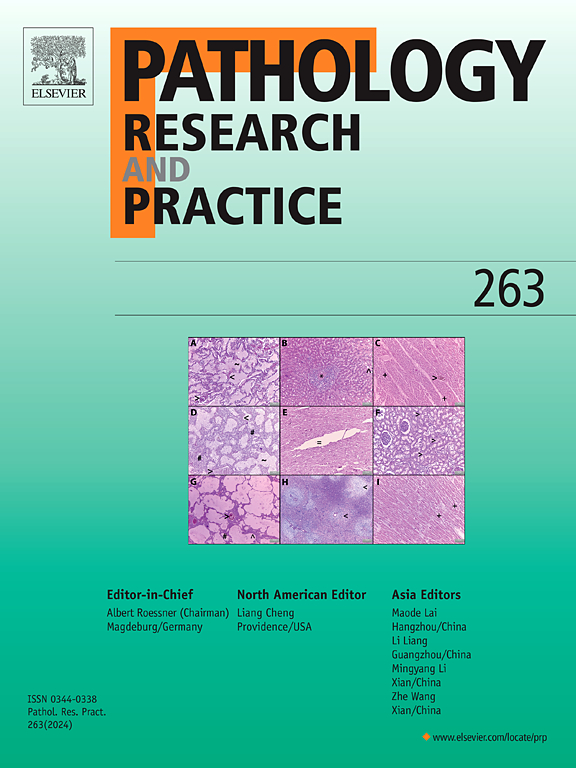Studying the non-coding RNA expression and its role in drug resistance mechanisms of gastric cancer
IF 2.9
4区 医学
Q2 PATHOLOGY
引用次数: 0
Abstract
Gastric cancer is the fifth most common malignancy and the fifth primary cause of death from cancer all over the world. Because of diagnosis of gastric cancer at advanced, incurable stages and limited response to treatment, the disease has an adverse prognosis and a low survival rate. Chemotherapy consisting of medications such as platinum and 5-Fluorouracil can be effective for patients with advanced stomach cancer. Nevertheless, drug resistance eventually leads to unsuccessful therapy and adverse outcomes for gastric cancer patients. Most therapy failures in gastric cancer patients undergoing chemotherapy are caused by the development of drug resistance. Several studies have shown that noncoding RNAs (ncRNAs) play important roles in the resistance of gastric cancer to chemotherapy drugs. The development of stomach cancer is greatly impacted by a number of ncRNAs, including microRNAs (e.g., miR-21, miR-27a), circular RNAs (e.g., CircPVT1), and long noncoding RNAs (e.g., HOTAIR). Because of their regulatory characteristics in certain genes implicated in the chemoresistant phenotype of gastric cancer, much evidence has demonstrated their function in the emergence and persistence of drug resistance. In the future, ncRNA-based treatment could represent a novel approach to treating drug resistance. Despite numerous studies on anticancer drug resistance mechanisms, it is still unclear how these mechanisms are regulated. In this review, we investigated the evolving function and molecular mechanisms of ncRNAs related to drug resistance, their function in controlling drug resistance in gastric cancer, and their potential to create targeted therapeutics for reducing drug resistance in gastric cancer.
研究非编码 RNA 的表达及其在胃癌耐药机制中的作用
胃癌是全球第五大常见恶性肿瘤,也是导致癌症死亡的第五大主要原因。由于胃癌确诊时已是晚期,无法治愈,且对治疗反应有限,因此预后不良,生存率低。由铂和 5-氟尿嘧啶等药物组成的化疗对晚期胃癌患者有效。然而,耐药性最终会导致治疗失败,给胃癌患者带来不良后果。大多数接受化疗的胃癌患者治疗失败的原因都是耐药性的产生。多项研究表明,非编码 RNA(ncRNA)在胃癌对化疗药物的耐药性中起着重要作用。胃癌的发展在很大程度上受到多种 ncRNA 的影响,包括 microRNA(如 miR-21、miR-27a)、环状 RNA(如 CircPVT1)和长非编码 RNA(如 HOTAIR)。由于它们对某些与胃癌化疗耐药表型有关的基因具有调控特性,许多证据都证明了它们在耐药性的出现和持续方面的功能。未来,基于 ncRNA 的治疗可能成为治疗耐药性的一种新方法。尽管对抗癌药物耐药机制进行了大量研究,但这些机制是如何调节的仍不清楚。在这篇综述中,我们研究了与耐药性相关的 ncRNA 不断演变的功能和分子机制、它们在控制胃癌耐药性方面的功能,以及它们在创造减少胃癌耐药性的靶向疗法方面的潜力。
本文章由计算机程序翻译,如有差异,请以英文原文为准。
求助全文
约1分钟内获得全文
求助全文
来源期刊
CiteScore
5.00
自引率
3.60%
发文量
405
审稿时长
24 days
期刊介绍:
Pathology, Research and Practice provides accessible coverage of the most recent developments across the entire field of pathology: Reviews focus on recent progress in pathology, while Comments look at interesting current problems and at hypotheses for future developments in pathology. Original Papers present novel findings on all aspects of general, anatomic and molecular pathology. Rapid Communications inform readers on preliminary findings that may be relevant for further studies and need to be communicated quickly. Teaching Cases look at new aspects or special diagnostic problems of diseases and at case reports relevant for the pathologist''s practice.

 求助内容:
求助内容: 应助结果提醒方式:
应助结果提醒方式:


